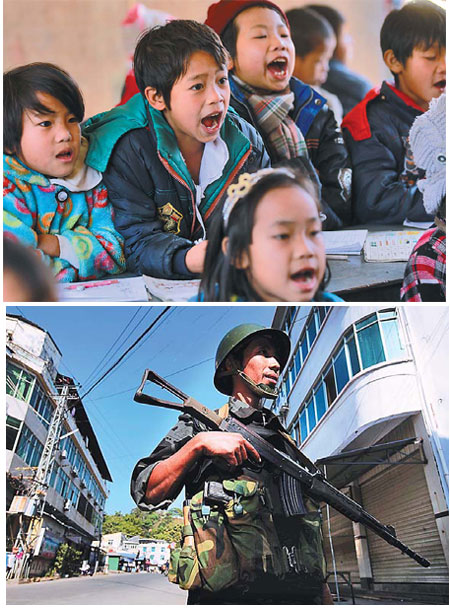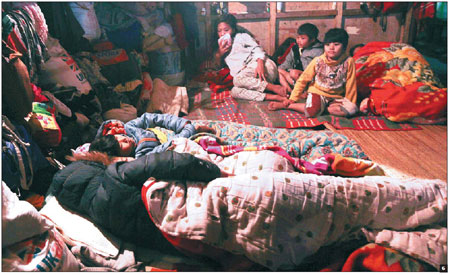Fear stalks land with abundance of natural resources
Updated: 2013-01-23 07:22
By Hu Yongqi (China Daily)
|
||||||||
|
Top: Students recite stories in the Je Yang Hka refugee camp in Myanmar. More than 7,000 refugees live in the camp. Above: A Kachin soldier in Laiza, the headquarters of the rebel Kachin Independence Army. Residents in the city have built bomb shelters. Photos by Cui Meng / China Daily |
Plight of refugees shows despair of Kachin, north Myanmar, Hu Yongqi reports from border area.
Bang! Bang! Two streams of smoke rose from the summit of the mountain behind the township of Nabang on Jan 17.
Meanwhile, tracers from anti-aircraft guns flashed in the air. Residents thronged the streets, asking each other "Did you see the aircraft?"
| ||||
Nabang has been badly affected since June 2011 as the violence has deterred visitors and resulted in a reduction in business.
"In the past four months, we have heard explosions every day. In the beginning, the blasts were pretty far away, but now they occur just behind the mountains. The conflict has stopped most of the trade with Kachin because no one wants to risk their life by coming here," said Xie Junchen, the manager of the Qixi Jade Store in Nabang, who has imported Myanmar jade into China for 10 years.
Kachin is a place Xie has to pass through on her trips between Myanmar and Nabang. During the first four years, her business boomed in tandem with the soaring price of jade.
However, her income has fallen along with the number of buyers since the latest round of battles between the Myanmar military and the KIA started in June 2011.
"My store has jade worth 1 million yuan ($161,000) and I can't move away. But, if it weren't for the business, my family wouldn't stay here, because we are worried that the bombs might fall on my store one day," she said.
A phone salesman, who asked to remain anonymous, said he hadn't sold a single handset for two weeks. Before the hostilities started, he averaged one sale a day.
The only beneficiaries have been the hotels that provide accommodation for the police who are keeping order in Nabang.
No explosions were heard in Nabang on Tuesday, after Myanmar's President U Thein Sein ordered the military to stop attacking the KIA from Saturday.
However, the thousands of refugees produced by the constant fighting are suffering as the fear of being killed vies with an unswerving determination not to surrender.
Nabang is the largest point of entry from Kachin in Yingjiang. It sits on the bank of the 6-meter-wide Laiza River, which acts as the border between the two countries, facing Laiza city. Locals said the red banners reading "Happy New Year, 2013" seem inappropriate to the people of Kachin, who live in constant fear and are driven by concerns about safety and the future.
Most of the Chinese merchants in Kachin have left their investments behind and retreated back home. In Laiza, all males aged 13 and older have been mobilized and have joined the KIA. Many rode motorcycles to the front, carrying guns and ammunition on their backs. On Friday morning, civilians and soldiers rushed to buy foodstuffs such as instant noodles before quickly "disappearing" for fear of being bombed. The city was like a ghost town after midday, only showing signs of life when the KIA troops showed up at night.
In the region surrounding Laiza, three refugee camps have been pressed into use to accommodate thousands of civilians. At a refugee camp in Laiza, most people live in 3-sq-m wooden sheds that are covered by a protective layer of iron plates. Exposed to direct sunlight, the sheds become unbearably hot and stuffy during the day. In one shed, a gray-haired woman got up when her son, a Kachin fighter, picked up the gun and helmet he'd left by her "bed", a bamboo mat on the floor, and headed off to the front line.
About 2 km south of Laiza, 600 refugees are being housed in the No 3 refugee camp, which was originally a vegetable market. The huge building, also covered with iron plates, has been divided into small cells. Seven women slept in a cell measuring less than 4 sq m. Their worldly goods - clothing, cooking pots and baskets - were either lying on the ground or hanging up on the bamboo walls. Temperatures plummeted at night, forcing an elderly man to set fire to a number of small pieces of wood to keep warm.
"It's a mess here, but at least it provides a place to stay," said La Gon, in his 30s.
Children continued their studies in the refugee camps. When they arrived, no schools had been built, so residents huddled together to leave enough room for classes. In most classes, Kachin-style bags served as desks, except for the few lucky students who had access to a real desk. Most of the kids had to sit on bamboo beds, but some latecomers simply stood near the door. Despite the conditions, their interest in the lessons the teacher had written on the blackboard was undiminished.
The conflict has not lessened the popularity of Chinese classes in the border city: The Kachin people share ethnicity with China's Jingpo ethnic group and have regular trading contact with them. The only school providing Chinese classes has been damaged and the kids now have to study at the refugee camps. Fu Xing, a 25-year-old volunteer from Shandong province who has been teaching Chinese at the Je Yang Hka refugee camp for 12 months, said the bombs don't scare the kids and they have retained their desire to learn.
Pah Hein Ohn, the Kachin deputy minister of health, said the conflict has left many people homeless and forced them into the refugee camps. "Our refugee camps have received about 60,000 people so far. As the war continues, the number will probably rapidly increase to 70,000," he said in an exclusive interview with China Daily. He pledged that more houses and toilet facilities will be built for the refugees.
Pah said the refugees consume a large amount of food every day, meaning that further supplies of food and medicine are desperately required. He added that charitable organizations from the United Kingdom, the United States and China have attempted to provide relief, but to no avail. "Most people in the camps are women and children. They are vulnerable to a wide range of diseases, especially when the rainy season comes in April," he added.
One volunteer, who gave his name as Zhang, has been helping the refugees for around 18 months. He said the hospital in Laiza has treated many people injured in the fighting or hit by shrapnel during air raids. "One extreme case was that of a soldier whose left foot was blown off. This war is really cruel and should be stopped."
The international community should consider providing more humanitarian aid to the refugees to alleviate their suffering, said He Shengda, a researcher at the Yunnan Academy of Social Sciences.
A quiet town
Currently, 107 students from Kachin are studying at Nabang Gateway Primary School; 90 percent of them are from Laiza. On Jan 17, the last day of the semester, many Chinese parents gathered at the school gate and waited to take their children home. Kachin parents prefer their children to stay at school because their homes have been destroyed or are too dangerous to live in, according to the principal Zhang Yongjun.
The Yingjiang county government has set up four camps to receive Kachin refugees, but no specific action plans have yet been formulated.
Zhang recalled that when he arrived in Nabang in 1999, most of the houses in Laiza were made of wood. However, as trade expanded, brick buildings were erected, and the city now bears a striking resemblance to neighboring Nabang, he said.
On Jan 15, a bomb fell on Chinese territory, according to the Ministry of Foreign Affairs. Red national flags were raised on the Chinese houses along the border on Jan 18 to make their identity clear to the Myanmar air force. Following the bombing, security has been tightened in Nabang, with around 40 police officers patrolling the streets. Although many residents bought vegetables and meat at the morning market, retailers said the sharp decrease in incomes caused by the conflict has resulted in fewer people crossing the border to shop at Nabang's market.
A 50-year-old pork seller, surnamed Yu, said the price of pork has fallen to 24 yuan per kilogram from 30 yuan two months ago, further cutting her profit margin. "Sluggish demand from Kachin has pushed down the price here, but in other towns it has risen to 32 yuan a kilogram," said Yu.
In the town, both the kyat - the currency of Myanmar - and the Chinese yuan were in use. Two Kachins shopping for pork at Yu's store were unable to afford the 45 yuan she asked after weighing a piece of meat. They only had 1,000 kyat (7.25 yuan / $1.16) to spend, so they slowly walked away and headed to a vegetable retailer to buy cabbage for 3 yuan.
"Things have changed a lot and the war has left the Kachin people unable to buy meat," sighed Yu.
Peace negotiations urged
Founded in 1961, the KIA has approximately 10,000 soldiers. After more than two decades of fighting, a cease-fire agreement was signed in 1994. Under the terms of the agreement, Myanmar's government offered to help the state with economic development and promised discussions about autonomy.
Under the Constitution of the Republic of the Union of Myanmar, which was adopted in 2008, all armed forces in the country must be placed under central military command. To achieve this, the government demanded that all cease-fire groups be incorporated into a single border guard force, which would entail disarming them, resupplying them with government-issued weapons and making them subordinate to regional Myanmar military commanders. Autonomy and political reconciliation were not up for discussion.
The cease-fire with the Kachins didn't hold and the conflict became bloodier. Having held four strategic highland areas in the region, the KIA has been beaten back and now occupies only one, which overlooks Laiza.
No Kachin delegates were allowed to participate in Myanmar's elections in 2008 and the long-standing distrust and hatred between them and the government in the capital, Nay Pyi Taw, is not likely to be eradicated easily, said He Shengda.
Xiong Liying, an assistant researcher at Yunnan Academy of Social Sciences, said more than 90 percent of Kachins are Christians, following activity by British missionaries in the 1870s, while most Myanmar people are Buddhists. "The differences in belief might obstruct negotiations. The Myanmar government should consider a new policy, one that would be acceptable to the ethnic groups," she said.
"The government of Kachin overestimated the KIA's military power, and the Myanmar forces are better equipped. More important, the Kachins misjudged the situation and believed that Western powers, especially the United States and a number of European countries, would provide backing. But the US is normalizing bilateral relations with Myanmar and won't exert much pressure on the government now," said Xiong.
Myanmar announced a unilateral cease-fire on Jan 18 following a visit by Fu Ying, the Chinese vice-minister of foreign affairs.
Peace talks are the only, and most correct, way of solving the conflict, said Hong Lei, a spokesman for the Chinese foreign ministry, on Monday. "We urged the parties to achieve a cease-fire after peace talks. China will continue to play a constructive role in maintaining peace and stability on the China-Myanmar border," he added on Tuesday.
However, Xiong pointed out that several meetings between the Myanmar government and the KIA last year failed to broker a new bilateral cease-fire. "It depends on what the two sides want from the cease-fire. Once that is known, we'll have a better idea of when this war will end," she said.
Li Yingqing, Guo Anfei and Zhang Yunbi contributed to this story.
Contact the reporter at huyongqi@chinadaily.com.cn
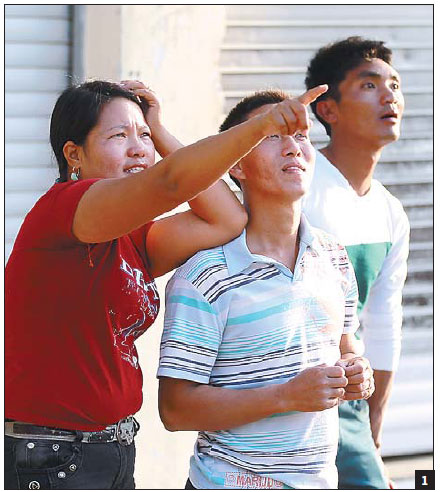
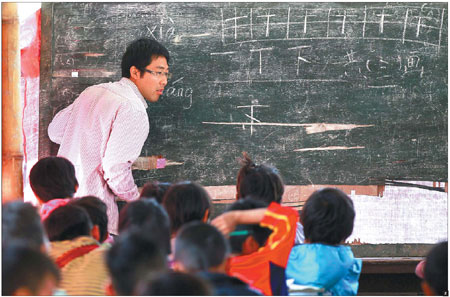
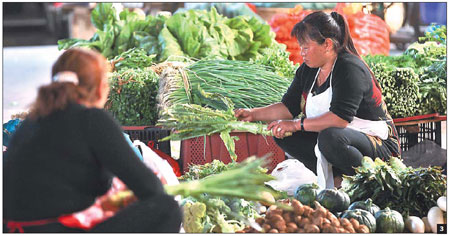
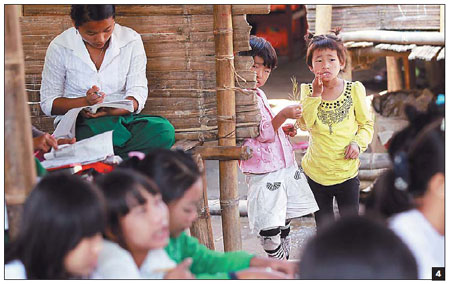
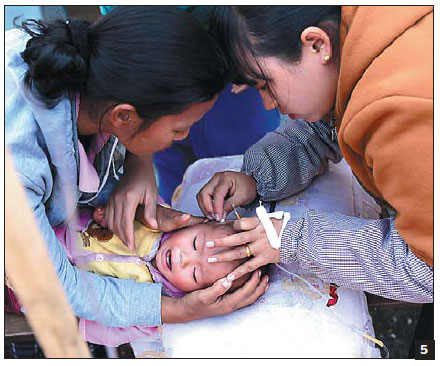
|
1. Residents in Nabang, Yunnan province, watch an air raid by the Myanmar air force. 2. Fu Xing, a 25-year-old volunteer from Shandong province, has been teaching Chinese at the Je Yang Hka refugee camp for 12 months. The conflict has not lessened the popularity of Chinese classes in the border city. 3. The vegetable market in Nabang has seen a drop in business. 4. Two Myanmar girls look in on lessons at a temporary classroom at the Je Yang Hka refugee camp. 5. A child receives treatment at a clinic at a refugee camp called Hpun Lum Yang Mare in Myanmar. 6. The No 3 refugee camp in Laiza city, Myanmar. Most of the refugees live in 3-sq-m wooden sheds that are covered by a protective layer of iron plates. Photos by Cui Meng / China Daily |
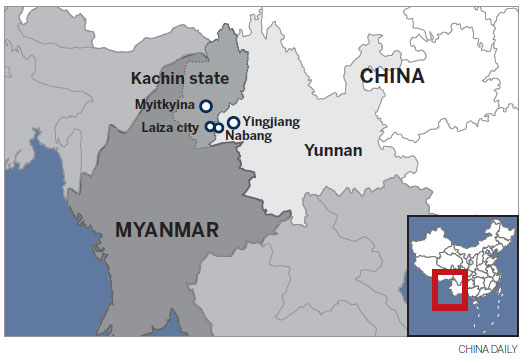
(China Daily 01/23/2013 page6)

 In Photos: 7.0-magnitude quake hits Sichuan
In Photos: 7.0-magnitude quake hits Sichuan
 Li Na on Time cover, makes influential 100 list
Li Na on Time cover, makes influential 100 list
 FBI releases photos of 2 Boston bombings suspects
FBI releases photos of 2 Boston bombings suspects
 World's wackiest hairstyles
World's wackiest hairstyles
 Sandstorms strike Northwest China
Sandstorms strike Northwest China
 Never-seen photos of Madonna on display
Never-seen photos of Madonna on display
 H7N9 outbreak linked to waterfowl migration
H7N9 outbreak linked to waterfowl migration
 Dozens feared dead in Texas plant blast
Dozens feared dead in Texas plant blast
Most Viewed
Editor's Picks

|

|

|

|

|

|
Today's Top News
Live report: 7.0-magnitude quake hits Sichuan, heavy casualties feared
Boston suspect cornered on boat
Cross-talk artist helps to spread the word
'Green' awareness levels drop in Beijing
Palace Museum spruces up
First couple on Time's list of most influential
H7N9 flu transmission studied
Trading channels 'need to broaden'
US Weekly

|

|
